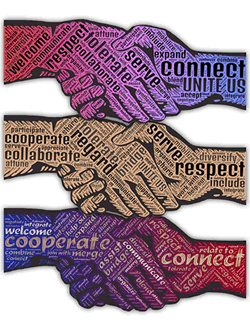 You’ve probably discovered, as I have, that some conversations are hard to have. As a result they can be put off; sometimes forever. Usually, it’s the fear of hurting another’s feelings or of feeling hurt by what they may say that stops us from taking action; however, avoidance is seldom the answer when resolution is the goal!
You’ve probably discovered, as I have, that some conversations are hard to have. As a result they can be put off; sometimes forever. Usually, it’s the fear of hurting another’s feelings or of feeling hurt by what they may say that stops us from taking action; however, avoidance is seldom the answer when resolution is the goal!
When situations are left unresolved, angst can build and relationships may suffer, so it makes sense to have tools at hand that can help build confidence to discuss issues as they arise and avoid misunderstandings and maintain respect. This is not always as easy as it sounds!
While most people would concede that there is no way to make these difficult conversations easy, there are some steps to follow that make them easier. It doesn’t matter who the conversation is with: colleagues, students, parents, partners or friends…the process is the same.
To make difficult conversations easier, follow this four step process:
- Acknowledge what’s up
- Listen first
- Show respect at all times and
- Use ‘We’ statements, to move forward.
If you’re contemplating a slightly tricky conversation that needs to be had, these steps are a great way to achieve the outcome you want, to be heard and to move forward with positive change.
Acknowledging what’s up
This requires stating how you feel about what is on your mind. The formula is “I am feeling _________ about ___________ (something that happened, a behaviour etc) Stating how you feel keeps the focus on the facts and avoids the blaming or shaming that often goes along with ‘You’ statements. Eg. You did __________ or you always __________.
Be prepared to listen – first
Ask, “I wonder what your thoughts are about this? Or “I wonder what happened?” The tricky part here is to listen for the facts and remember that the other party likely doesn’t know how better to handle the situation either. Keep the focus of the conversation on the original issue and keep an ear out for a new perspective or some information that you weren’t aware of. It’s okay. Their feelings are valid too.
Keep the conversation respectful – at ALL times
This means the conversation can only continue as long as there is respect. It’s okay to say, “This isn’t how I want to be spoken to and I won’t speak to you like that, so let’s try again.” This may mean agreeing to delay the conversation for a little while until emotions have settled again. This part of the formula is a biggie. It’s easy to say something flippantly that won’t help you achieve your desired outcome. Be careful that you don’t burn trust when you really want to build it!
Use ‘WE’ statements to move forward
By keeping the focus off ‘YOU’ or ‘I’ and talking in terms of ‘WE’, it’s easier to find a way forward, together. Think of it like standing side by side and looking ahead at the goal; all that’s left is to decide HOW you will navigate any hurdles you encounter in the path. WHO will do WHAT, WHEN?
Other factors, like choosing the right time and setting are also very important. Turn off your phones and whenever possible, speak face-to-face. Avoid texting and phone conversations if at all possible – it’s too easy to read between the lines and miss facial cues, making a good outcome more difficult, rather than easier!
Oh, one other thing…it’s easy to talk about the best way to do things, but at some point it’s necessary to bite the bullet and have the conversation. It won’t be easy, but it can be easier with the right conditions in place.
______________________________________________________________
Laurie Morrison is cofounder of Bare Hands and the Resilient Families programme. Resilient Families helps educators build collaborative partnerships with families via weekly ‘Edu-Bytes’ – practical skills and strategies for happier more harmonious families. Educators can get access to five FREE Edu-Bytes by going to www.barehands.com.au/families/
You can also visit their website at www.barehands.com.au

